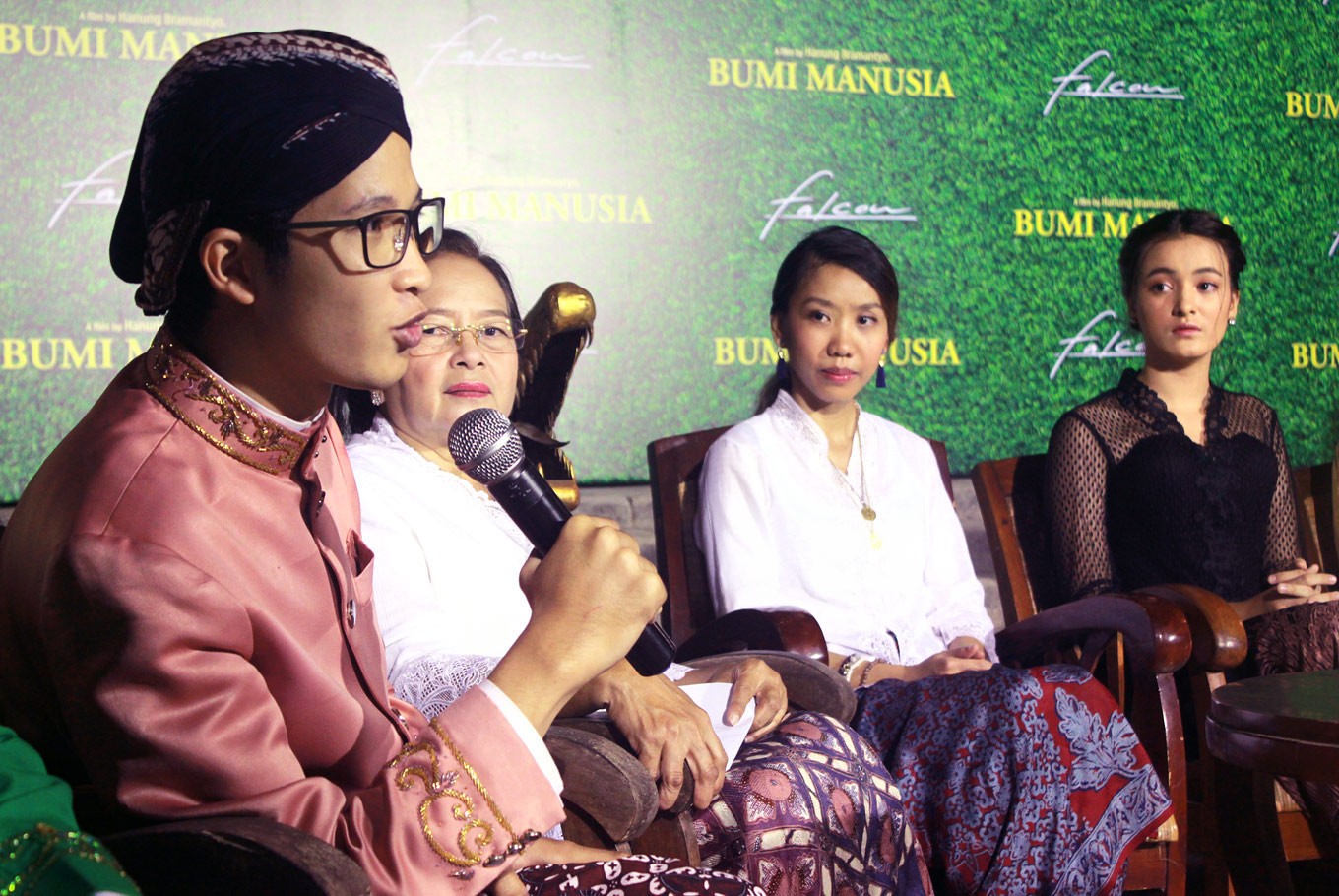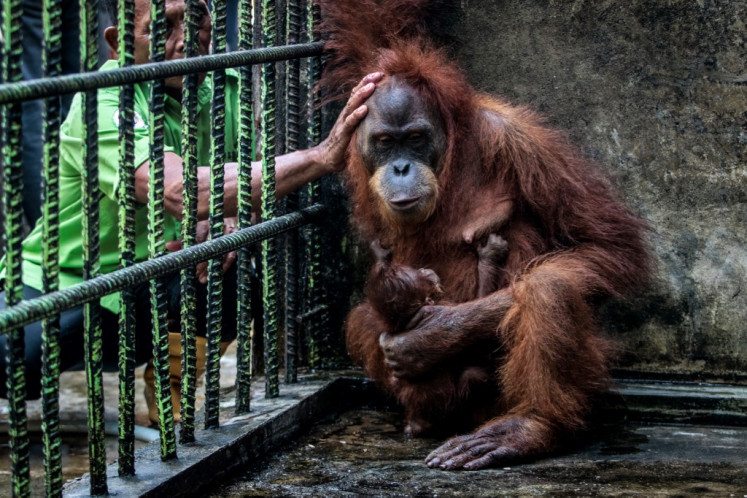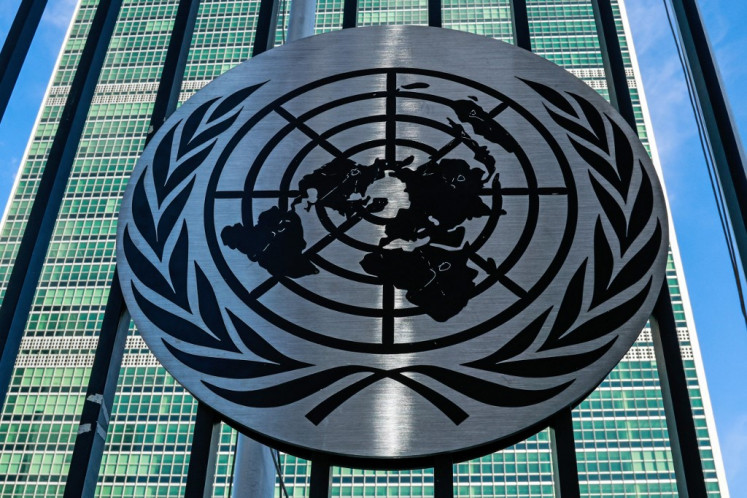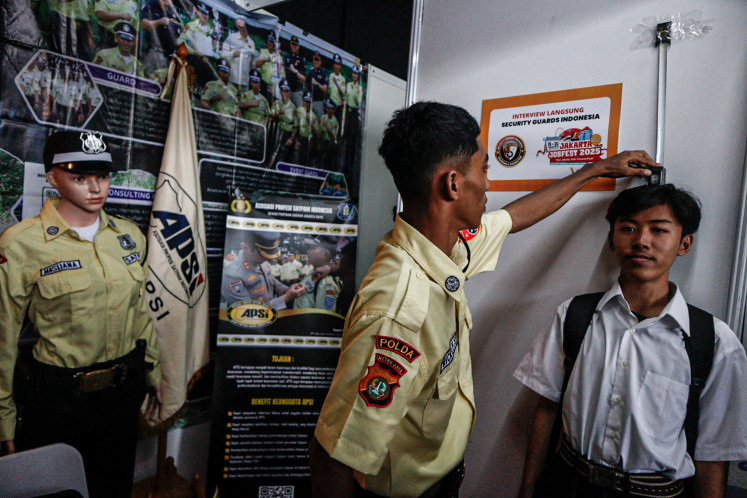Popular Reads
Top Results
Can't find what you're looking for?
View all search resultsPopular Reads
Top Results
Can't find what you're looking for?
View all search results'Bumi Manusia' simplified to lure millennial generation
“This is an honor to Pram himself, who struggled to secure the recognition of his civil rights by shedding his blood,” said Astuti Ananta Toer.
Change text size
Gift Premium Articles
to Anyone
A
stuti Ananta Toer, the fourth child of Pramoedya “Pram” Ananta Toer, was overwhelmed with emotions as she spoke during the first day of filming for her father’s magnum opus, Bumi Manusia (This Earth of Mankind), by Falcon Picture.
“This is an honor to Pram himself, who struggled to secure the recognition of his civil rights by shedding his blood,” she said during a recent press conference to mark the production of Bumi Manusia at Studio Alam Gamplong in Sumber Rahayu village, Sleman, Yogyakarta.
Astuti expressed her hope that the film, starring Iqbaal Ramadhan (as Minke), Mawar Eva De Jongh (as Annelies) and Ine Febriyanti (as Nyai Ontosoroh), would become a motion picture of good standing.
Pram is considered one of Indonesia’s greatest writers whose works have received acclaim from international communities. However, due to his alleged affiliation with the banned Indonesian Communist Party (PKI), his name was removed from Indonesian literature during the anti-communist New Order era, which lasted from 1966 to 1998.
Bumi Manusia is the first of Pram’s beloved tetralogy, written during his banishment on Buru Island from 1965 to 1979.
Bumi Manusia tells the story of Sanikem (Ontosoroh), a concubine of a Dutch man who overcomes various obstacles to be recognized by society. Along with her daughter Annelies and son-in-law Minke, she fought the Dutch authorities who had seized her property.
The character of Minke was based on Tirto Adhi Soerjo, the first Indonesian journalist to manage a newspaper, Medan Prijaji, and initiate the Islamic Trade Union.
The complete tetralogy — Bumi Manusia, Anak Semua Bangsa (Child of All Nations), Jejak Langkah (Footsteps) and Rumah Kaca (House of Glass) — has been translated into 45 languages. Falcon Pictures publicist Andri said that the production company might adapt the other books in the tetralogy but for now, it would focus on Bumi Manusia.
Max Lane, in his 2017 book Indonesia Tidak Hadir di Bumi Manusia (No Indonesia on this Earth of Mankind) claims that the tetralogy forms a revolutionary epic that made an intellectual and political contribution to Indonesia that has never been truly exposed. Lane began translating Pram’s quartet into English in 1980.
Ironically, Bumi Manusia is not on the list of books for compulsory reading in Indonesian schools, even after the New Order crumbled in 1998.
As a result, most of the country’s younger generations have very little knowledge of Pram and his works, which once earned him a Nobel Prize nomination in literature.
Angga Okta Rahman, one of Pram’s grandchildren, said the author narratedBumi Manusia to detainees on Buru to keep their spirits alive. From the late 1960s to the early 1970s, many government captives committed suicide to escape the harsh conditions of prison, which included torture.
“Take a look at Nyai Ontosoroh, she’s a strong woman and you’re all men, you shouldn’t be inferior to her,” Angga imitated Pram’s words of encouragement to his fellow prisoners.
“Through this film, we as family members are hoping that movie audiences can further enhance their strength to become even more courageous and better appreciate justice, truth, art and culture,” he said.
Hanung Bramantyo, who will direct the film adaptation, said he was proud that his aspiration to adapt Bumi Manusia for the big screen had finally come true. When he was a student, Hanung conveyed his intention to Pram.
“At the time, Pram laughingly said that Bumi Manusia was already under negotiation with Hollywood filmmaker Oliver Stone and he was sorry for not being able to let me handle the novel,” Hanung recalled, adding that shooting will begin in July.
Read also: Iqbaal Ramadhan to star in 'Bumi Manusia' film adaptation
Around 60 percent of the film will be shot at Gamplong studio to represent Nyai’s home and Kranggan, a corner of Surabaya, East Java, equipped with tram cars and houses built with Chinese architecture.
“The rest of the movie will be shot in Semarang [Central Java],” he added.
By casting Iqbaal — who is popular among millennial film-goers — to play the role of Minke, Hanung aimed to attract a younger audience.
Iqbaal gained national fame through his performance in Dilan 1990, which was a box-office hit.
“Dilan 1990 gave momentum for Indonesian films, receiving a tremendous response from the millennial generation,” Hanung noted.











